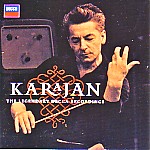In 1995 Decca reissued Herbert von Karajan’s complete orchestral recordings with the Vienna Philharmonic in a 9-CD boxed set. Here is a space-saving, budget-priced counterpart to commemorate the conductor’s 2008 centenary: same couplings, same transfers, same booklet notes. Just how legendary are these recordings? Surely the logy, often lugubrious Dvorák Eighth and the overly homogenized Brahms First and Third symphonies pale against Karajan’s tauter, more incisively projected Berlin Philharmonic remakes (specifically his late-1970s EMI Dvorák and digital DG Brahms). The Brahms Tragic Overture suffers from impossibly dragged-out tempos at the beginning and end, and a crassly whipped-up middle section. Of the two Haydn symphony offerings, I prefer the more animated and judiciously balanced interpretation of No. 104 to the string-heavy No. 103.
The Mozart 40th and 41st symphonies draw me in by virtue of the sweetly singing, never cloying strings, yet Szell/Cleveland’s textural diversity and sharply honed chamber music aesthetic makes Karajan/Vienna sound like elevator music by comparison. The Vienna Beethoven Seventh is lighter and suppler than Karajan’s two earlier studio versions, and markedly different from Solti’s more angular, harder-hitting contemporaneous Vienna traversal. My only quibble concerns the conductor’s slackening of pulse during the Allegretto’s A major section.
Despite the unquestionable virtuosity and coloristic range distinguishing Karajan’s early-’70s DG Strauss Don Juan, Also Sprach Zarathustra, Till Eulenspiegel’s Lustige Streiche, Tod and Verklärung, and the Dance of the Seven Veils, you can argue in favor of the Vienna versions’ more animated lyrical episodes. Given Karajan’s genius for illuminating so-called orchestral showpieces, perhaps it’s surprising how the seven Johann and Josef Strauss selections fall short of the finesse and tonal magic the conductor usually brought to this genre (the stereo Philharmonia recordings and the 1987 Vienna Philharmonic New Year’s Day concert, for example).
Karajan’s Vienna recording of Holst’s The Planets had its day as a sonic spectacular, but who knew that a planetary golden age lay just ahead with Haitink, Steinberg, Solti, Mehta, Boult, and Ormandy, to say nothing of Karajan’s superior digital DG remake? However, the three Tchaikovsky ballet suites plus the same composer’s Romeo and Juliet abound with rhythmic verve, theatrical character, and palpable linear clarity. These comments also apply to the Grieg Peer Gynt selections and Adam’s Giselle. In sum, Karajan fans will know if they need this comprehensive, albeit uneven collection.
































